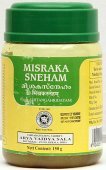Svarnakshiri, Svarṇakṣīrī: 8 definitions
Introduction:
Svarnakshiri means something in Hinduism, Sanskrit, biology. If you want to know the exact meaning, history, etymology or English translation of this term then check out the descriptions on this page. Add your comment or reference to a book if you want to contribute to this summary article.
The Sanskrit term Svarṇakṣīrī can be transliterated into English as Svarnaksiri or Svarnakshiri, using the IAST transliteration scheme (?).
In Hinduism
Ayurveda (science of life)
Rasashastra (Alchemy and Herbo-Mineral preparations)
Source: Wisdom Library: Rasa-śāstraSvarṇakṣīrī (स्वर्णक्षीरी):—One of the sixty-seven Mahauṣadhi, as per Rasaśāstra texts (rasa literature). These drugs are useful for processing mercury (rasa), such as the alchemical processes known as sūta-bandhana and māraṇa.
Nighantu (Synonyms and Characteristics of Drugs and technical terms)
Source: WorldCat: Rāj nighaṇṭuSvarṇakṣīrī (स्वर्णक्षीरी) is the Sanskrit name for an unidentified medicinal plant, according to verse 5.55-56 of the 13th-century Raj Nighantu or Rājanighaṇṭu. Note: Also see Kṣīriṇī (or Satyānāsī as it is known in Hindi) which can be identified with any of the following: 1) Garcinia morella Desr., 2) Euphorbia thomsoniana Boiss., 3) Argemone mexicana Linn., 4) Euphorbia pilosa Linn.—Also see Svarṇakṣīrī.
Svarṇakṣīrī is mentioned as having seven synonyms: Svarṇadugdhā, Svarṇāhvā, Rukmiṇī, Suvarṇā, Hemadugdhi (Hemadugdhī), Hemakṣīrī and Kāñcanī.
Properties and characteristics: “Svarṇakṣīrī is cooling (hima), bitter (tikta), anti-kapha and anti-pitta. It is anthemintic and very efficacious in dysuria, stones, oedema, burning sensation and fevers”.

Āyurveda (आयुर्वेद, ayurveda) is a branch of Indian science dealing with medicine, herbalism, taxology, anatomy, surgery, alchemy and related topics. Traditional practice of Āyurveda in ancient India dates back to at least the first millenium BC. Literature is commonly written in Sanskrit using various poetic metres.
Biology (plants and animals)
Source: Google Books: CRC World Dictionary (Regional names)Svarnakshiri in India is the name of a plant defined with Argemone mexicana in various botanical sources. This page contains potential references in Ayurveda, modern medicine, and other folk traditions or local practices It has the synonym Echtrus trivialis Lour. (among others).
Example references for further research on medicinal uses or toxicity (see latin names for full list):
· American Midland Naturalist (1914)
· Mem. Torrey Bot. Club (1958)
· Tropical Plant Science Research. New Delhi (1983)
· Nomenclator Botanicus. (1840)
· Fieldiana, Botany (1946)
· Histoire Naturelle des Végétaux (1839)
If you are looking for specific details regarding Svarnakshiri, for example extract dosage, diet and recipes, pregnancy safety, health benefits, side effects, chemical composition, have a look at these references.

This sections includes definitions from the five kingdoms of living things: Animals, Plants, Fungi, Protists and Monera. It will include both the official binomial nomenclature (scientific names usually in Latin) as well as regional spellings and variants.
Languages of India and abroad
Sanskrit dictionary
Source: Cologne Digital Sanskrit Dictionaries: Shabda-Sagara Sanskrit-English DictionarySvarṇakṣīrī (स्वर्णक्षीरी).—f. (-rī) A medicinal kind of moon-plant, said to be brought from the Himalaya mountains. E. svarṇa gold, (like or yellow,) kṣīra milk, or milky sap, ṅīṣ fem. aff.
Source: Cologne Digital Sanskrit Dictionaries: Monier-Williams Sanskrit-English DictionarySvarṇakṣīrī (स्वर्णक्षीरी):—[=svarṇa-kṣīrī] [from svarṇa] f. Cleome Felina, [cf. Lexicographers, esp. such as amarasiṃha, halāyudha, hemacandra, etc.]
Source: Cologne Digital Sanskrit Dictionaries: Yates Sanskrit-English DictionarySvarṇakṣīrī (स्वर्णक्षीरी):—[svarṇa-kṣīrī] (rī) 3. f. A medicinal kind of moon-plant.
[Sanskrit to German]
Sanskrit, also spelled संस्कृतम् (saṃskṛtam), is an ancient language of India commonly seen as the grandmother of the Indo-European language family (even English!). Closely allied with Prakrit and Pali, Sanskrit is more exhaustive in both grammar and terms and has the most extensive collection of literature in the world, greatly surpassing its sister-languages Greek and Latin.
Kannada-English dictionary
Source: Alar: Kannada-English corpusSvarṇakṣīri (ಸ್ವರ್ಣಕ್ಷೀರಿ):—[noun] the small thorny plant Datura stramonium of Solanaceae family.
Kannada is a Dravidian language (as opposed to the Indo-European language family) mainly spoken in the southwestern region of India.
See also (Relevant definitions)
Partial matches: Kshiri, Svarna.
Starts with: Svarnakshirinika.
Full-text (+10): Tiktadugdha, Hemadrika, Hemashikha, Hemadugdhi, Hemadugdha, Himavati, Svarnadugdha, Hemakshiri, Rukmini, Hemashika, Kancani, Hemahva, Svarnakshirinika, Hemanga, Ibhaya, Ibhasha, Svarnahva, Suvarnakshiri, Payasya, Kanakakshiri.
Relevant text
Search found 4 books and stories containing Svarnakshiri, Svarṇakṣīrī, Svarnaksiri, Svarna-kshiri, Svarṇa-kṣīrī, Svarna-ksiri, Svarṇakṣīri, Svarṇa-kṣīri; (plurals include: Svarnakshiris, Svarṇakṣīrīs, Svarnaksiris, kshiris, kṣīrīs, ksiris, Svarṇakṣīris, kṣīris). You can also click to the full overview containing English textual excerpts. Below are direct links for the most relevant articles:
Rasa Jala Nidhi, vol 4: Iatrochemistry (by Bhudeb Mookerjee)
Part 43 - Treatment for indigestion (41): Jivana rasa < [Chapter IV - Irregularity of the digesting heat]
Rasa Jala Nidhi, vol 3: Metals, Gems and other substances (by Bhudeb Mookerjee)
Part 6 - Process of preparing Sarva-kshara < [Chapter XXVIII - Kshara (akalis)]
Rasa Jala Nidhi, vol 5: Treatment of various afflictions (by Bhudeb Mookerjee)
The Agni Purana (by N. Gangadharan)
Related products

